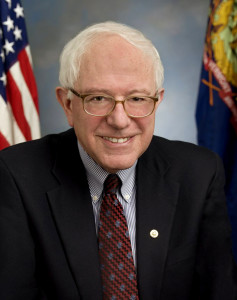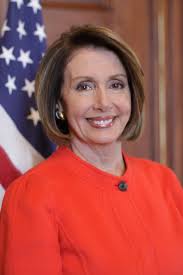
Ilhan Omar
The two most media-savvy new House members from the last election were undoubtedly Ilhan Omar and Alexandria Ocasio-Cortez (AOC). AOC has single-handedly made the Green New Deal a topic of discussion, and Omar has broken the Washington consensus that one can’t say bad things about Israel without being destroyed by the Israeli lobby as an anti-semite.
Along the way, they’ve also shifted–or started shifting–the Overton window on topics like Reagan being a racist (AOC) and on Obama being a mass murderer (Omar).
They’re a bit less radical than they seem: Omar, for example, is for the two-state solution in Palestine, but compared to what was allowed to be said previously, what was allowed to be supported previously, they are radical.
Meanwhile, the Democratic presidential field has as its norm support for Medicare for All, breaking up the big tech monopolies, and so on.
What it’s possible to talk about and espouse has changed.
On the other side of the ledger, the simple fact is that most of the new Democratic house members who were elected in 2018 are “moderates” and they have also received, overall, better committee assignments than the left-wingers.
Nancy Pelosi, who’s in charge of House Democrats, openly mocked the idea of the Green New Deal.
The Democratic Party establishment is still run by moderates; and those moderates still respect the right and despise the left.
Nor have Omar and AOCs’ voting records been as radical as their rhetoric.
So, are they, and the Presidential candidates, the harbingers of the turning of the tide?
Yes. But not that it will definitely be as left-wing as we might like. There is a demographic turn that is certain. Pelosi and other baby boomers are old. This is the end for them. They have another four to eight years at most, and then most of them will be replaced. The Millenials (who are no longer young) are coming of political age. Unlike GenX, which was not numerous enough to replace the Boomers wholesale, they will be the new majority in politics.
How radical they will be remains to be seen. The trends are optimistic, but Millenials have an authoritarian streak as well as a radical one. Certainly we can expect them to take climate change, for example, more seriously: They will have to live with the results, while the Boomers always knew they’d be dead before it really mattered.
We will know by the end of 2024 approximately how this is going to play out. That’s when the demographic edge will simply require that Millenials take over.
That’s not long from now. To put into perspective, it’s only three house elections away.
If the future is to be better, we will, in the old and tired blogosphere saw, need better democrats than the ones we are electing now. AOC and Omar are outliers, even among their own generation, within Congress.
I’m actually somewhat optimistic. I think that as the Overton window turns, and given just how much pain both the young and the old are in America (with soaring suicide rates, drug addiction, and declining life spans among key constituencies) that there’s a good chance of positive change.
There remains a strong chance of negative change as well. In 2010, I stated that the next President after Obama would be a right-wing populist or authoritarian. It was obvious, because Obama was fucking up and had decided to favor the rich and screw the middle class and poor.
When people are in pain they will choose the disruptive alternative. In 2016, that disruptive alternative was Trump (if Sanders had been the Presidential candidate for the Democrats, I agree with the polling that says he would have won, as he was also disruptive and, unlike Trump, not clearly a cruel lunatic).
So we have cycles: The Democrats get their chance. The Republicans get their chance.
When one of them actually succeeds and makes enough Americans clearly better off in ways that Americans can feel, they’ll lock down politics for the next 30 years or so, in the same way that FDR did and that Reagan and Thatcher did.
If they fail, they will simply pass the ball to the other party.
So far Democrats have been satisfied–more than satisfied–with just passing the ball back and forth. They liked Republicans, basically agreed with neoliberalism and wealth concentration (why not, Democratic leaders personally benefited), and didn’t want to upset the status quo.
AOC, and in particular Omar, are not okay with the status quo. Neither are most of the serious Democratic candidates for President.
If these candidates actually go on to govern in ways change the status quo in a way that is win for a clear voting majority of Americans (and non-voters can become voters), then they will succeed at turning the tide. If they don’t, they won’t.
What individuals do often does matter. It goes against the grain of our society with its “wisdom of crowds” consensus to admit this. A few individuals, chosen by large numbers of people, will likely decide if the US has a turn for another Golden (or more likely, Silver) Age, or not.
Choose wisely.
The results of the work I do, like this article, are free, but food isn’t, so if you value my work, please DONATE or SUBSCRIBE.



 Let us take as a given that Russia interfered in the last US election (though many of the accusations are unconvincing, some appear to be be true).
Let us take as a given that Russia interfered in the last US election (though many of the accusations are unconvincing, some appear to be be true). Most of you have, probably, by now, heard of Ocasio-Cortez, the insurgent Democratic Socialist candidate who defeated incumbent Joseph Crowley in a New York House Primary–and by a large margin.
Most of you have, probably, by now, heard of Ocasio-Cortez, the insurgent Democratic Socialist candidate who defeated incumbent Joseph Crowley in a New York House Primary–and by a large margin.